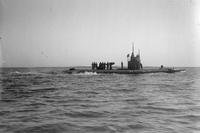Nearly 80 years after George Owen Squier's death, a company he founded sold for more than $300 million. Squier never could have envisioned what would become of the company he started as Wired Radio Inc. in 1922, before changing its name to Muzak in 1934.
But his legacy is so much more than the background music heard in restaurants, shops and other public places. An inventor who was granted 65 patents, Squier was also a major general who transformed the Army forever.
"He spent his career inventing and forging new structures in the U.S. Army," a 2014 story in the Tennessean newspaper said.
Confronted with an unsettled home life, Squier (pronounced "Square") dropped out of school when he was 14 years old, "advised by his grandfather and an uncle not to go to school anymore, for he had enough education to do all the business he would ever want to do." The young teen stopped his studies at the time but eventually graduated from the U.S. Military Academy in 1887, and many historians believe he was the first West Point graduate to attain a Ph.D. (from Johns Hopkins University in Baltimore).
Forty years before the Air Force became a separate military branch, Squier spearheaded the creation of an aeronautical division in the U.S. Army Signal Corps in 1907. He helped design the specifications for the first military aircraft to be acquired by the Army and was the first military officer to fly in a plane, a Wright Brothers Flyer in 1908.
Promoted to chief signals officer during World War I, Squier, now a major general, was charged with coordinating all communications and aviation for the Army during the conflict. He went on to establish the service's first signal school at Fort Leavenworth, Kansas, and its radio research laboratory at Fort Monmouth, New Jersey. Near the end of his military career, Squier also helped establish Langley Field in Virginia, which became a research hub for military and civilian aviation.
All the while, Squier was innovating.
"The army provided Squier with many opportunities for study and research in areas of interest to him," one summary of historical papers on Squier said. "As a scientist, he conducted research on such topics as the electrochemical effects due to magnetization, the sine wave systems of telegraphy and ocean cabling, [and] the absorption of electro-magnetic waves by living vegetable organisms, among others. His inventions were primarily in the area of telephony: wireless, multiple, and long-distance."
Looking to improve the military's long-range communications, Squier tested his theories on whatever resources were available. (He even substituted trees as antennas once to see whether sound could be transmitted farther, clearer and better. It could.)
Nothing Squier devised, though, changed the lives of more service members or civilians than when he developed the concept of multiplexing in 1910.
Multiplexing -- the ability to send more than one signal over one line at the same time by dividing the bandwidth -- enabled Squier's idea of piped-in music ultimately to become reality.
More importantly, it contributed greatly to the development of the internet and fiber optics, and made possible the seemingly endless programming choices on cable television and streaming.
Still, not everyone was impressed. Unconvinced of its viability, engineers at AT&T initially scoffed at multiplexing. Then, they took another look and begrudgingly endorsed Squier's findings.
"AT&T officials began a reappraisal of the 'wired wireless' system, as Squier chose to call it, and by 1914 development of a commercial system was underway," according to IEEE Communications Magazine. "By 1918, however, when the AT&T system went into service, AT&T was claiming that Squier's work had only been 'suggestive' and that its system was based on inventions of its own engineers."
After Squier's work on multiplexing, he was awarded several patents regarding delivering music and other information via wires. When Wired Radio was formed in 1922, the initial aim was to deliver music to the populace through private subscriptions. Its mission changed as the popularity of regular radio grew in the late 1920s and early 1930s, putting it into more homes and causing the company's business model to be reimagined.
Thus, Muzak was pitched to businesses as a way to break the silence. Customers heard Muzak for the first time in 1936, two years after Squier died at age 69.
Although Muzak is not as prevalent as it once was, the technology remains as strong as ever.
"Without the innovations of George O. Squire [sic], our lives would be vastly different today," according to the U.S. World War One Centennial Commission's website.
-- Stephen Ruiz can be reached at stephen.ruiz@military.com.
Want to Know More About the Military?
Be sure to get the latest news about the U.S. military, as well as critical info about how to join and all the benefits of service. Subscribe to Military.com and receive customized updates delivered straight to your inbox.
















